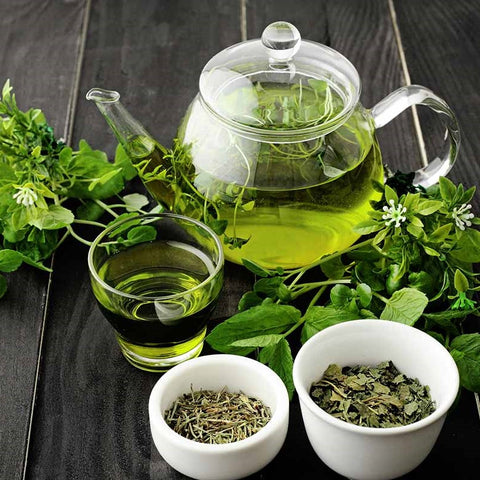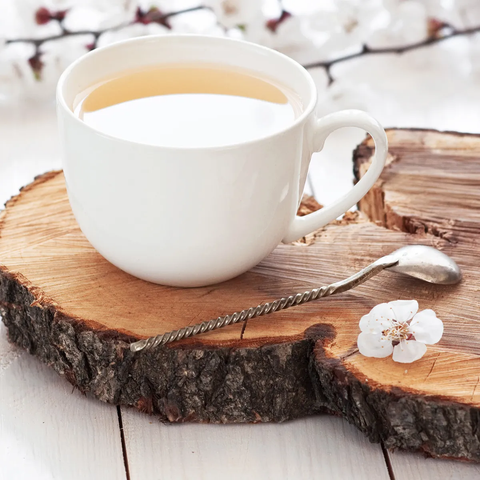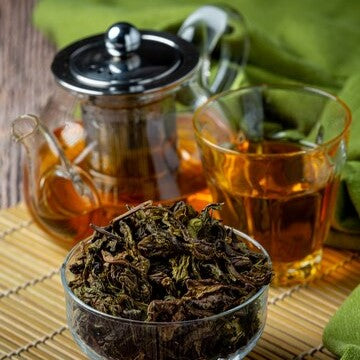There’s nothing a freshly steeped cup of tea can’t fix and we can all vouch for that. Whether you are starting your day with a steaming cup or enjoying your break with colleagues, a nice and aromatic cup of tea can certainly make all the difference. For centuries now, this famous invention from the East has taken over the world and intrigued the attention of many Western scholars over the years. The surprising health benefits of this daily drink will leave you quite impressed. In this section, we will explore the different types of tea and the benefits of consuming them. Let’s get started!
1. Black Tea
As Indians, we are incomplete without our chai. Black tea is the most popular choice of tea in most Indian households with cabinets lined with tea tins and other containers brimming with them. Forming the basis of our beloved chai are black tea leaves, which are harvested and then oxidised for up to a good 8 hours to attain their distinctive black colours. Whether consumed with milk or plain with lemon, honey, spices or even herbs, the health benefits of this tannin-rich tea are quite understated.
Benefits:
Boosts Heart Health - Black tea is rich in a group of antioxidants called flavonoids, which have been long associated with lowering high levels of blood pressure and improving overall cardiovascular health.
Brings Down Bad Cholesterol - Many significant studies have revealed that consumption of black tea daily significantly reduces the level of low-density lipoprotein or “bad cholesterol” in the bloodstream.
Promotes Gut Health - The polyphenols in black tea help good bacteria in your digestive tract, balancing your gut microbiome and promoting better gut health.
Explore: https://nestasia.in/collections/teapots
2. Green Tea
We’re no strangers to the fact that green tea has a multitude of health benefits, and we often resort to it to help with weight loss, to reduce bloating, and so much more. When enjoyed without milk and sugar, this zero-calorie soothing beverage is often our post-lunch or evening companion. After harvesting, the tea leaves are heated by pan-firing, preventing the onset of oxidation and, in turn, browning. Depending on how green tea is prepared, the flavour profile ranges from slightly grassy to vegetal without much astringency. Green tea also has lower caffeine content compared to black tea, making it a great alternative for those determined to cut down on their caffeine consumption. Let’s quickly catch you up to speed with the remarkable health benefits of this tea.

Explore: https://nestasia.in/collections/tea-sets
Benefits:
Prevents Cognitive Decline - Some studies suggest that the high concentration of antioxidants present in green tea wards off certain neurodegenerative diseases, such as Alzheimer’s and Parkinson’s. These antioxidants prevent cell damage, thereby reducing the risk of chronic illnesses.
Helps Keep Type 2 Diabetes in Check - If you are wondering what makes green tea an elixir for those who are pre-diabetic or suffering from diabetes, it’s the catechins. These are a group of polyphenols that not only reduce oxidative stress but also reduce the effects of insulin resistance by significantly lowering the absorption of carbohydrates by the body.
Supports Weight Loss - Recommended by many dietitians, green tea packs a ton of antioxidants that help break down fat. They also increase your metabolic rate, helping you burn more calories in your weight loss journey. Recent studies have shown that steeped tea has a much better impact on weight loss than green tea extract.
3. White Tea
Although white tea is harvested from the same plant as black and green tea, a slight difference in the harvesting method renders the white colour. Unfurled leaves and young buds covered by fine white hairs are plucked and instantly dried in heating vents or wind chambers. This preserves the colour of these delicate tea leaves. Based on the region of harvest, the flavour profiles tend to vary drastically but a rich nutty, and slightly earthy note seems to run through all of them. White tea has the lowest caffeine levels in the green-black-white tea triad, making it the best choice for caffeine-averse individuals. But the health benefits of this mild tea are truly marvellous.

Fights Free Radicals - Free radicals are compounds that pose many threats to the body and have been linked with chronic inflammation and a compromised immune system. The powerful antioxidants in white tea best combat free radicals, saving your body from their harmful effects.
Protects Your Teeth - Regular consumption of white tea helps keep your pearly whites in good shape. Quite surprisingly, white tea contains fluoride. In combination with sugar, the bacteria that builds up releases acid that leaches and decays your teeth, forming cavities. The fluoride in white tea makes the surface of your teeth resistant to these acid attacks, keeping your dental health up to par.
Keeps Skin Youthful - White tea works wonders for your skin, reducing both internal and external aging. When consumed, the polyphenol content in white tea is known to suppress cellular damage to our skin’s fibre network which is protected by a protein called elastin. This helps keep the extendable fibres in the skin intact, keeping it taut and firm. As for external use, white tea extracts have delivered promising results against harmful UV rays.
4. Oolong Tea
Oolong tea falls somewhere between black tea and green tea in the oxidation range. It is basically a type of partially oxidized tea but that’s not all. While processing oolong tea, the leaves are rolled into tight balls or twisted into curls, which greatly alters their taste, colour, and appearance. The flavour profile of oolong tea varies from floral to grassy, making it a delightful sip for those with an inclination toward said notes. In terms of caffeine content, oolong tea shares a resemblance with green tea, with each 250 ml cup containing 50-75 mg of caffeine. However, the remarkable health benefits of this one-of-a-kind tea make it stand out.
Also explore: https://nestasia.in/collections/cup-mug

Benefits:
Boosts Brain Activity - Oolong tea is rich in an amino acid called L-theanine, which relaxes the brain and improves cognitive function. Regular consumption of this tea is believed to enhance concentration, improve memory, and process information.
Supports Immune System - The flavonoids in oolong tea are miracle workers when it comes to supporting and maintaining the body’s immune system. It prevents cellular damage and gives your body a chance to fend for itself, especially during the flu season.
Induces Restful Sleep - Oolong tea has a blend of gamma-aminobutyric acid (GABA) and L-theanine; these compounds work in unison to contribute to deeper, lasting, and restful sleep. Incorporating this brew into your nighttime routine will certainly ease you into a good sleep schedule.
Conclusion
As we unveil a spectrum of flavours, aromas and benefits, bring a dose of wellness into your life with tea. From a punchy black tea that is known for its heart health benefits to a mild and delicate white tea that’s cherished for its antioxidant prowess, with every sip, each tea offers unique advantages to both the mind and the body. We hope this quick read sheds some light on how every tea bodes well for you and your family so that you can integrate it into your daily routine.






















